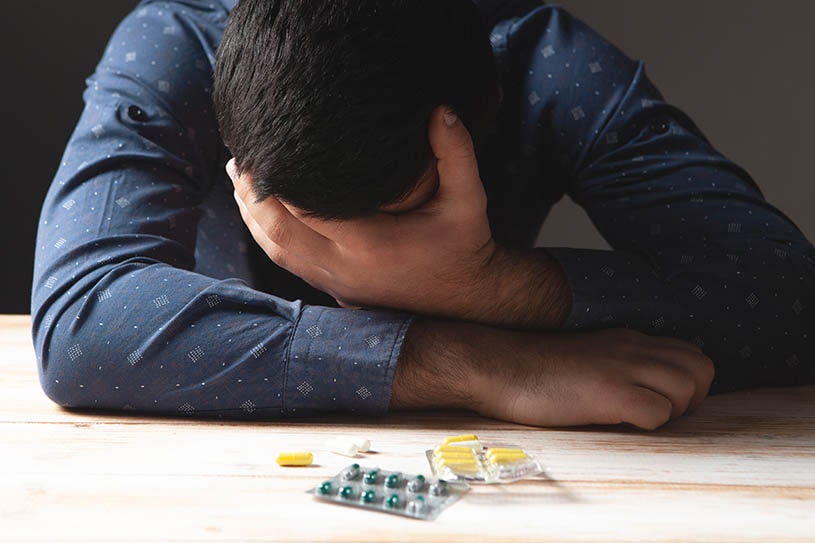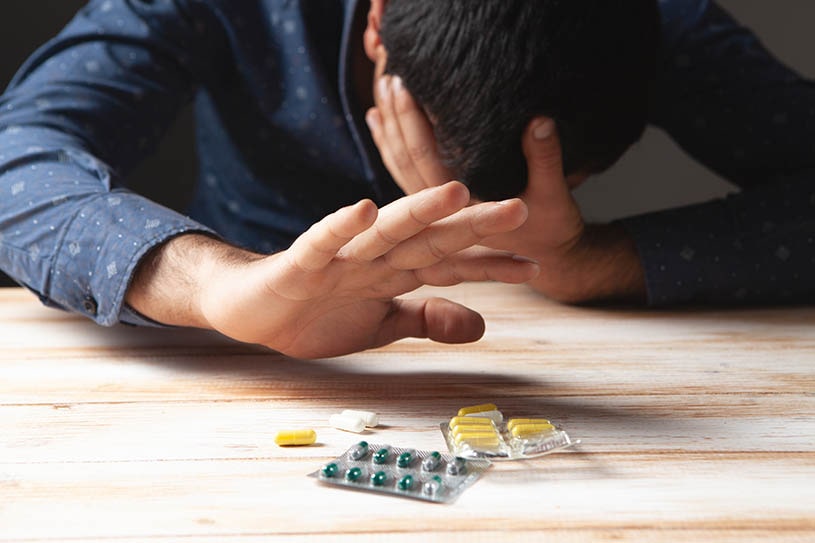Lisinopril is the generic name for an angiotensin-converting enzyme inhibitor (ACE inhibitors) prescription medication, sold under the popular brand name, Zestril. It is commonly prescribed for the treatment of high blood pressure, various heart diseases, diabetic kidney disease and to help prevent future strokes and heart attacks. Lisinopril starts working within a few hours after taking it and it shows its peak effects after almost 7 hours of ingestion while half of this drug leaves an individual’s body almost 12 hours after ingestion.
Table Of Contents:
However, it might take a few weeks to experience its anti-hypertensive effects. Although it is beneficial to lower blood pressure and treat heart failure, abruptly limiting the intake of the drug or stopping Lisinopril cold turkey can result in numerous withdrawal symptoms that might be fatal. Find out more about Lisinopril withdrawal symptoms and how patients can discontinue the use slowly and safely under a doctor’s supervision.
Lisinopril Withdrawal Mechanism
In the case of most medications, abrupt discontinuation after extended use of the drug can have serious side effects. The reason for this is that the level of balance in the human body (homeostasis) has adjusted to the medication’s effects. However, when the medicine is no longer being consumed, the homeostasis is interrupted, and once again, the system tries to readjust itself. In that process, withdrawal symptoms arise, which are also known as discontinuation syndrome. In the case of anti-hypertensive medication discontinuation syndrome, the symptoms mainly mimic sympathetic overactivity. This is attributable to the decrease in catecholamine release, which in turn results in increased secretion of nor-epinephrine. This eventually leads to a rapid increase in blood pressure. Similarly, stopping Lisinopril abruptly has harmful side effects that are described below.

Lisinopril Withdrawal Symptoms
Lisinopril is used for lowering blood pressure and reducing heart damage caused by damaged blood vessels. It is not known as an addictive drug or a controlled substance, but if stopped abruptly, it can result in physical and psychological withdrawal symptoms.
The Symptoms That Most Commonly Occur After the Abrupt Cessation of Lisinopril Are:
- Nervousness, sweating, facial flushing
- Headaches
- Nausea and vomiting.
- Agitation, tremors, insomnia
- Palpitations
The other signs associated with abrupt cessation of this drug include tachycardia (increased heart rate), elevated blood pressure, diaphoresis(abnormally increased sweating), and, in some cases, elevations of plasma and urinary catecholamine concentrations. Extremely rare, serious sequelae of sudden discontinuation can be malignant hypertension with papilledema, accelerating angina, myocardial infarction, ventricular arrhythmias, and left ventricular failure. These signs and symptoms usually begin almost 24-72 hours after the drug discontinuation and last for a variable, sometimes prolonged, duration.
Complications And Dangers of Lisinopril Withdrawal
After stopping Lisinopril suddenly, the patient may experience a sudden, marked increase in blood pressure known as Rebound Hypertension. This may be equal or higher than the baseline blood pressure (BP at the time of diagnosis of hypertension), hence increasing the load on vital organ systems of the body such as the heart, kidney, and brain. This eventually leads to an increased risk for heart attack and heart failure, cerebrovascular accidents, and kidney damage. It becomes more difficult to control the BP after the withdrawal takes place which poses dangers to the patient’s life as the vital organ systems of the body are affected.
Rebound Hypertension
The term rebound hypertension refers to the return of high blood pressure to levels that were present before starting the medication or a return to even above those levels. This may occur within 48 hours of stopping this drug. The blood pressure increase appears to stabilize after about five days, but it may not drop significantly. Certain people, such as diabetic patients, are at a greater risk of rebound hypertension, while patients who have a lower high BP before starting the medication, experience less of a rebound.
An Increased Threat Of Heart Attack And Heart Failure
Abruptly stopping this drug can cause huge fluctuations in the users’ BP, which may increase the load on the heart. This predisposes the patient to various heart-related problems such as cardiac arrest or heart attack. This is especially common for patients already suffering from heart conditions.
Greater Possibility Of Stroke
Stopping the usage of such medications abruptly can cause a massive spike in BP, increasing the possibility of experiencing a stroke. The higher the BP goes, the greater the risk of a stroke. Sudden increments in the patients’ blood pressure without any regulatory medication can have a disastrous effect on cerebrovascular circulation which can be fatal.
Increased Threat Of Kidneys Failure
In people with kidney diseases, sudden discontinuation of Lisinopril can result in renal organ failure. The sudden rise in blood pressure further weakens the damaged renal blood vessels leading to impaired renal function and deterioration of existing kidney disorders.
Palpitations And Angina Pains
If a patient stops taking this drug suddenly, they may experience a sudden spike in blood pressure, which may lead to heart palpitations and angina pains. Sudden discontinuation of Lisinopril use can disrupt the homeostasis(balance) of a patient’s body leading to dysfunction of vital organs which can increase mortality among these patients.

Lisinopril Withdrawal Timeline
The withdrawal timeline may differ from patient to patient and depends on the drug’s dosage and duration of use. The higher the dose and the longer it has been used, the greater time it may take to wean off Lisinopril. If a doctor recommends stopping taking it, he/she may use a combination of reducing the dosage over a few weeks or utilizing an ACE inhibitor substitute.
Doctors may also recommend natural alternatives to this drug, which may include healthy lifestyle changes such as a balanced diet, regular exercise, cessation of smoking or alcohol intake, etc.
Factors That Affect Lisinopril Withdrawal Duration
As with most medications, sudden and abrupt discontinuation of Lisinopril will lead to withdrawal which can be mild or extremely severe.
The degree and duration of severity depend on the following factors:
- Age: The age of the patient taking this drug affects the duration of withdrawal symptoms in that patient. Elderly patients are more likely to experience more withdrawal symptoms of this drug for a longer period as compared to younger ones.
- Dosage: The dose of this drug being consumed at the time of discontinuation is one of the key factors affecting the severity of its withdrawal. If the drug is being used at a higher dose and it is stopped abruptly, the patient is bound to experience more side effects that will take a longer time to dissipate.
- Duration of use: How long has this drug been used before stopping it is a crucial factor regarding its withdrawal duration. The longer the medication has been consumed, the more withdrawal symptoms will be experienced by the patient, and for a longer duration of time.
- Health condition: The severity and duration of withdrawal also depend on whether the blood pressure is well-controlled at the time of abrupt discontinuation or not. Patients are bound to experience severe withdrawal symptoms for a longer time if the BP wasn’t controlled and vice-versa. The presence of other medical conditions such as kidney diseases, heart diseases also implies a longer withdrawal duration.
Hence, the overall health condition of the patient is crucial at determining the duration of withdrawal he/she may experience after the abrupt discontinuation of Lisinopril.
How To Get Off Lisinopril Safely?
If a patient is suffering from the side effects of Lisinopril or feels like they don’t need to take as much medication as before, they should consult their physician. This way the physician can keep track of any changes in bodily functions or vital signs and address them. In the best case, individuals are more likely to succeed in stopping its consumption by gradually lowering the dose and switching to a healthy diet, and keeping physically fit by getting more exercise.
Also, it is best to keep a blood pressure monitoring device handy and to check and record the readings 3 to 4 times a week. This way, the doctor will be able to formulate the best tapering plan. Make sure to include leafy, green vegetables in the diet and limit sugars as much as possible.
The doctor can then discuss a withdrawal plan with the patient, where they reduce the dosage of this drug for a few weeks or even months, depending on the patient’s health situation and medical history. However, more caution will have to be taken with elderly patients who may experience rebound hypertension. If the patient’s blood pressure heightens by attempting to stop Lisinopril, the doctor may suggest the use of substitute medication or some other approach to medically control hypertension, taking into account Zestril drug interactions.
Abuse of Prinivil can happen rarely. This condition could cause additional difficulties during the withdrawal period. To overcome this condition, patients are advised to check abuse treatment options. Healthcare professionals can diagnose the exact condition and help to select the best rehab in the area.
Hope Without Commitment
Find the best treatment options. Call our free and confidential helpline
Most private insurances accepted
Page Sources
- Cummings, D. M., & Vlasses, P. H. (1982). Antihypertensive drug withdrawal syndrome. Drug intelligence & clinical pharmacy, 16(11), 817–822. https://doi.org/10.1177/106002808201601102
- Reidenberg M. M. (2011). Drug discontinuation effects are part of the pharmacology of a drug. The Journal of pharmacology and experimental therapeutics, 339(2), 324–328. https://doi.org/10.1124/jpet.111.183285
- Hubbell, F. A., & Weber, M. A. (1980). Adverse effects of sudden withdrawal of antihypertensive medication. Postgraduate medicine, 68(2), 129–138. https://doi.org/10.1080/00325481.1980.11715513
- Alharbi, F. F., Souverein, P. C., de Groot, M. C., Maitland-van der Zee, A. H., de Boer, A., & Klungel, O. H. (2017). Risk of acute myocardial infarction after discontinuation of antihypertensive agents: a case-control study. Journal of human hypertension, 31(8), 537–544. https://doi.org/10.1038/jhh.2017.1
- Breekveldt-Postma, N. S., Penning-van Beest, F. J., Siiskonen, S. J., Falvey, H., Vincze, G., Klungel, O. H., & Herings, R. M. (2008). The effect of discontinuation of antihypertensives on the risk of acute myocardial infarction and stroke. Current medical research and opinion, 24(1), 121–127. https://doi.org/10.1185/030079908x253843
- DeJong, C., & Grant, R. W. (2020). Continuation of Angiotensin-Converting Enzyme Inhibitors and Angiotensin Receptor Blockers in the Face of Kidney Disease Progression-Safe and Possibly Life Saving. JAMA internal medicine, 180(5), 727. https://doi.org/10.1001/jamainternmed.2020.0300
- Karachalios, G. N., Charalabopoulos, A., Papalimneou, V., Kiortsis, D., Dimicco, P., Kostoula, O. K., & Charalabopoulos, K. (2005). Withdrawal syndrome following cessation of antihypertensive drug therapy. International journal of clinical practice, 59(5), 562–570. https://doi.org/10.1111/j.1368-5031.2005.00520.x
- Nonoguchi, H., Kiyama, S., Inoue, H., Nakayama, Y., Inoue, T., Kohda, Y., Machida, K., Tajima, A., Kitamura, K., Miyoshi, T., Shimada, H., Shimada, H., Tajiri, M., Honda, Y., Tanaka, M., & Tomita, K. (2003). Angiotensin-converting enzyme inhibitor withdrawal and ACE gene polymorphism. Clinical nephrology, 60(4), 225–232. https://doi.org/10.5414/cnp60225
- Gilstrap, L. G., Fonarow, G. C., Desai, A. S., Liang, L., Matsouaka, R., DeVore, A. D., Smith, E. E., Heidenreich, P., Hernandez, A. F., Yancy, C. W., & Bhatt, D. L. (2017). Initiation, Continuation, or Withdrawal of Angiotensin-Converting Enzyme Inhibitors/Angiotensin Receptor Blockers and Outcomes in Patients Hospitalized With Heart Failure With Reduced Ejection Fraction. Journal of the American Heart Association, 6(2), e004675. https://doi.org/10.1161/JAHA.116.004675

 Authored by
Authored by  Reviewed by
Reviewed by 